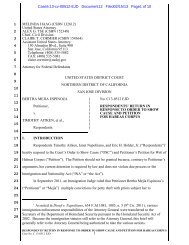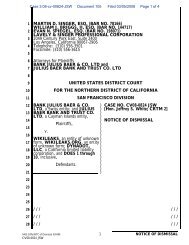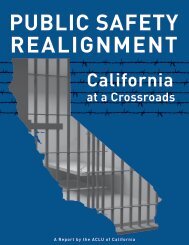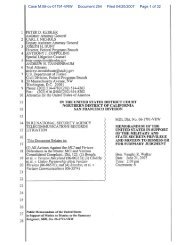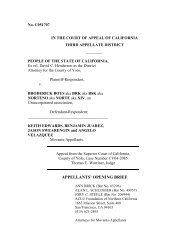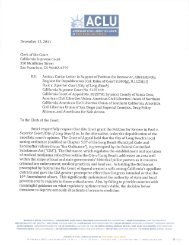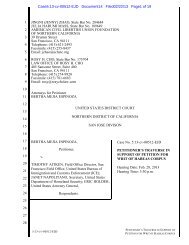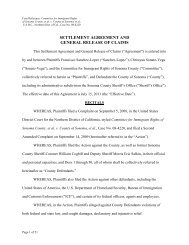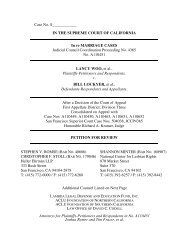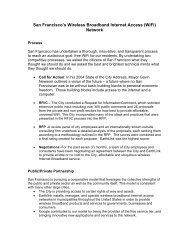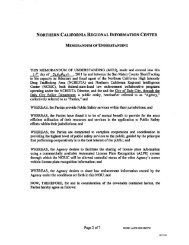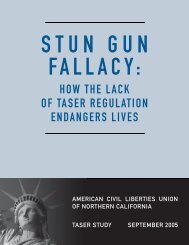file a brief - ACLU of Northern California
file a brief - ACLU of Northern California
file a brief - ACLU of Northern California
Create successful ePaper yourself
Turn your PDF publications into a flip-book with our unique Google optimized e-Paper software.
1<br />
2<br />
3<br />
4<br />
5<br />
6<br />
7<br />
8<br />
9<br />
10<br />
11<br />
12<br />
13<br />
14<br />
15<br />
16<br />
17<br />
18<br />
19<br />
20<br />
21<br />
22<br />
23<br />
24<br />
25<br />
26<br />
27<br />
28<br />
likewise impermissibly overbroad.” Id. The suit was against an airport for diminution in plaintiffs’<br />
property values and other damages caused by operation <strong>of</strong> the airport. Id. at 849. Yet “plaintiffs’<br />
constitutionally protected associational activities, even those concerned with protesting airport<br />
operations, appear quite unrelated to the matters placed at issue by plaintiffs’ complaints.” Id. at 859-<br />
60. The Court therefore concluded that the discovery orders “go[] far beyond any limited disclosure<br />
that defendant’s legitimate litigation interests may justify.” Id. at 852.<br />
Disclosure orders must satisfy Britt whenever they implicate First Amendment freedoms, and<br />
are not triggered solely by speech or associational activities that occur in private. The purpose <strong>of</strong><br />
Britt’s heightened scrutiny is to “safeguard” “constitutionally protected activity … from governmental<br />
interference.” Id. “First Amendment freedoms, such as the right <strong>of</strong> association,” the Court observed,<br />
“‘are protected from attack not only against heavy-handed frontal attack, but also from being stifled by<br />
more subtle governmental interference.’” Id. (citation omitted).<br />
Our Supreme Court has made clear that the government can violate free speech protections by<br />
surveilling speech that occurs in public settings. In White, the plaintiff, a pr<strong>of</strong>essor at UCLA,<br />
challenged the Los Angeles Police Department’s practice <strong>of</strong> attending classes and preparing reports<br />
about classroom discussions. See White, 13 Cal.3d at 762. The Court held that “police surveillance <strong>of</strong><br />
university classrooms and organizations meetings” can impermissibly chill speech, in violation <strong>of</strong> the<br />
free speech protections in the state and federal constitutions, and reversed the trial court’s grant <strong>of</strong> a<br />
demurrer. Id. at 767 & n.3. Notably, the Court rejected the defendant’s argument that the<br />
“‘semipublic’ nature <strong>of</strong> a university classroom negates any claim <strong>of</strong> ‘First Amendment privacy.’” Id.<br />
at 768 n.4. Although a teacher or student exposes her views to other class members whenever she<br />
speaks in class, the Court explained that “such a risk is qualitatively different than that posed by a<br />
governmental surveillance system involving the filing <strong>of</strong> reports in permanent police records.” Id.; cf.<br />
also Lo-Ji Sales v. New York, 442 U.S. 319, 329 (1979) (“there is no basis for the notion that because a<br />
retail store invites the public to enter, it consents to wholesale searches and seizures [by the<br />
government] that do not conform to Fourth Amendment guarantees.”). Federal courts, similarly, have<br />
recognized the infringement on First Amendment rights when the government records otherwise<br />
public speech. See, e.g., Community-Serv. Broadcasting <strong>of</strong> Mid-America, Inc. v. FCC 593 F.2d 1102,<br />
6<br />
CASE NO. 12025934<br />
APPLICATION AND [PROPOSED] BRIEF OF AMICI CURIAE ISO MOTION TO QUASH SUBPOENA BY PEOPLE TO TWITTER, INC.



